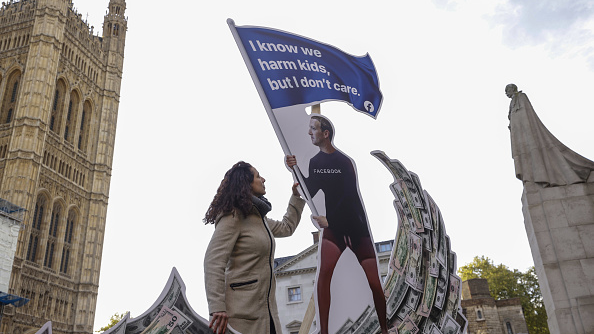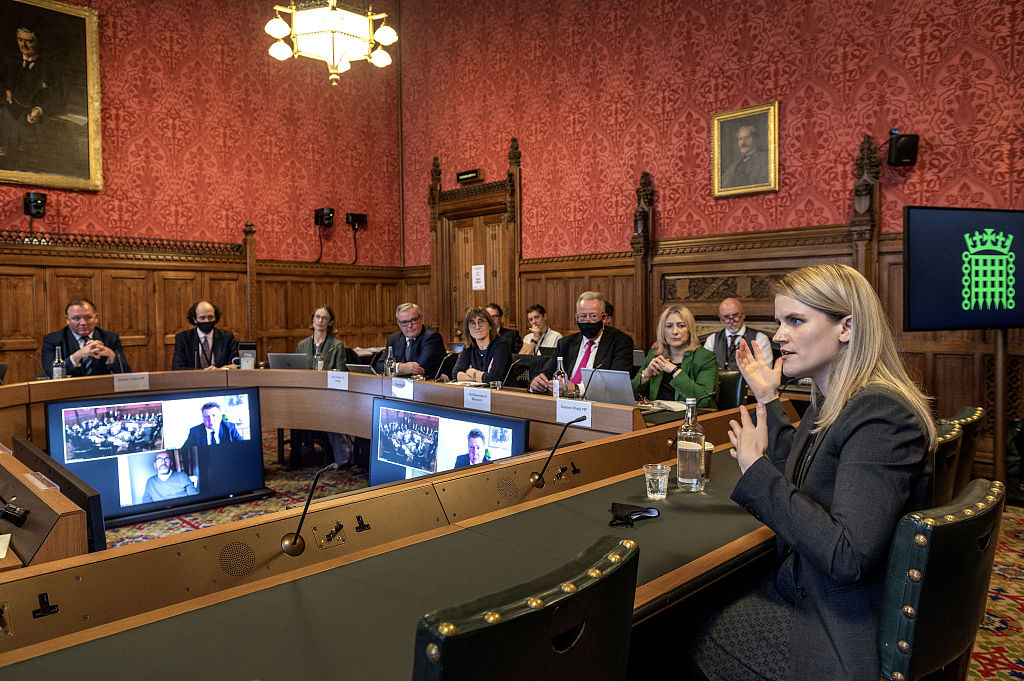
An installation depicting Facebook Inc. Chief Executive Officer Mark Zuckerburg during a protest outside Parliament in London, UK, October 25, 2021. /Getty
An installation depicting Facebook Inc. Chief Executive Officer Mark Zuckerburg during a protest outside Parliament in London, UK, October 25, 2021. /Getty
Editor's note: Bradley Blankenship is a Prague-based American journalist, political analyst and freelance reporter. The article reflects the author's opinions and not necessarily the views of CGTN.
Facebook is currently experiencing the worst crisis of its 17-year history as it faces a combination of whistleblower testimony, public relations disasters and Congressional inquiries, all of which it faced before but never all at once. The main takeaway from this crisis, which can be found in a series of stories from a consortium of 17 U.S. media organizations, dubbed the Facebook Papers, is that Facebook is a serious danger to the world.
Much of this controversy stemmed from Facebook's role, which it has publicly denied, in enabling the U.S. Capitol riots on January 6, when supporters of then President Donald Trump stormed the Capitol building to stop the certification of the 2020 presidential election. They falsely believed the election was "stolen" largely due to misinformation spread on platforms like Facebook and its subsidiaries.
While this is bad enough and exposes how much of a chaotic mess U.S.-style "democracy" is, the Facebook Papers actually reveal that this platform is a greater threat to other countries around the world. That's because while more than 90 percent of the site's monthly users are outside of the U.S. and Canada, only 13 percent of the company's work hours are dedicated to regulating content outside of the U.S.
This means that situations like the January 6 Capitol riots are virtually guaranteed to happen around the world more frequently without serious government policy changes.
As the papers make clear, the company fundamentally lacks the resources to moderate speech because of a shortage of moderators who speak foreign languages and understand cultural contexts, as well as a lack of adequate artificial intelligence solutions to flag harmful speech in foreign languages.
These blindspots mean countries like Afghanistan are becoming hotbeds of extremism thanks to Facebook's inability to regulate content, meanwhile everyday speech in countries like Syria and Palestine is suppressed because common words are flagged.
India, the world's second-largest country by population, is heavily disaffected by misinformation, linked to Facebook and its subsidiaries, which is triggering murders and mob killings. The Facebook Papers reveal that the platform's recommendation algorithm fuels hate speech and misinformation, while the company lacks the resources to address the problem.

Facebook whistleblower Frances Haugen gives evidence to the joint committee for the Draft Online Safety Bill, as part of government plans for social media regulation, London, UK, October 25, 2021. /VCG
Facebook whistleblower Frances Haugen gives evidence to the joint committee for the Draft Online Safety Bill, as part of government plans for social media regulation, London, UK, October 25, 2021. /VCG
In an extreme example, the coup d'etat that took place in Myanmar in February already serves as a case in point for how social media can be used to totally disrupt civil society. During this event, the Burmese military cut phone and television networks while leaving social media to fill this vacuum with misinformation and discord.
Facebook played a pivotal role in helping the country's military overturn the results of an election just about one month after the January 6 insurrection in Washington, D.C.
Facebook's lack of cultural sensitivity has also had a compounding blowback effect in the U.S. through diaspora communities that consume social media in their native language.
A Nielsen report released earlier this month showed that 28 percent of the evaluated news websites in the U.S., where Latinos accounted for 10 percent of audiences, contained content flagged as mixed, biased, extremely biased, conspiracy or pseudoscience.
Experts believe the spread of this misinformation, mainly through platforms like the Facebook-owned messaging app WhatsApp, is reflected in this community's relatively low vaccination rate, high vaccine hesitancy and the fact that many voted for Donald Trump in the 2020 presidential election thanks to false claims spread online.
In the wake of this scandal, Facebook is just days out from a rebranding overhaul that will probably see the company change its name (and probably also its focus) in an effort to escape a much-needed reckoning. Governments around the world should not be fooled but pay attention to this scandal because it represents a serious opportunity to protect civil society from the harmful effects of this irresponsible company.
It's also no coincidence that a country like China has managed to evade all of these problems through responsible social media regulations, wrongfully dubbed by some Western countries' media as an "authoritarian takeover of the internet." The events of these past several days are perhaps the greatest vindication for China's regulations, and countries around the world should be taking notes.
(If you want to contribute and have specific expertise, please contact us at opinions@cgtn.com.)

